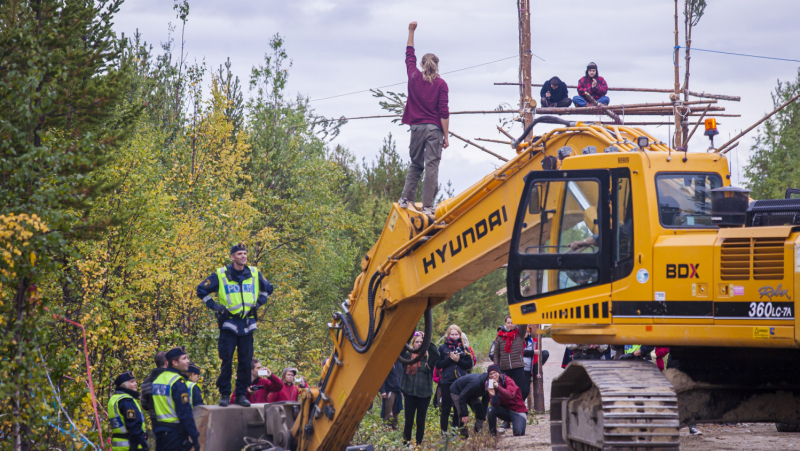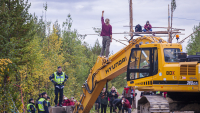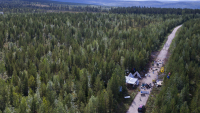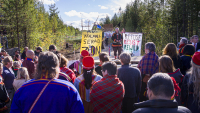Project – On record
This profile is no longer actively maintained, with the information now possibly out of dateOlivia Linander, Skiftet

Project – On record
This profile is no longer actively maintained, with the information now possibly out of dateOlivia Linander, Skiftet
Why this profile?
The Kallak mine would impact water safety and biodiversity, and have a devastating impact on the Indigenous reindeer herding communities and would mean the evacuation of a whole village.
What must happen
Banks and other financial institutions should not fund the Kallak iron ore mine nor provide finance for its owner, Beowulf Mining. Local and regional councils should not give the final permits as the mine clearly violates Indigenous rights.
| Sectors | Mining |
| Location |
|
| Status |
Planning
Design
Agreement
Construction
Operation
Closure
Decommission
|
| Website | https://beowulfmining.com/projects/sweden/kallak/ |
British mining company Beowulf Mining wants to open the Kallak open cast iron mine in northern Sweden, between the towns of Jokkmokk and Kvikkjokk. The site of the mine at Kallak (or Gállok, as it is called by the Sámi people) is less than 40 kilometres from the Laponia world heritage site, and would threaten its world heritage status. The mine would cover 1,300 hectares, in an area with two competing interests: Indigenous reindeer herding and iron mining. Both are protected by Swedish law as “areas of national interest”.
Impact on human rights and communities
The mine would have a devastating impact on the Indigenous reindeer herding communities. Combined with other existing use of the land such as hydro-electric dams and agroforestry, an open pit mine and the roads needed for it, would completely cut off the natural reindeer migratory routes. This would make it impossible for the local Sámi communities that depend on the herd for their livelihood and culture to continue to exist. Two Sámi communities, Jåhkågasska and Sirges, would face direct devastating impacts, but many other communities would also face the indirect consequences.
The review also concluded that reindeer husbandry within and outside the boundaries of the World Heritage Site would be directly threatened by the mine. In fact Jon-Mikko Länta, chairperson of Jåhkågasska sami village, and Jakob Nygård, chairperson of Sirges sami village have stated that an open cast mine in Gallok (the original place name in the Lule Sámi language) would make further practice of their culture and their livelihoods impossible. This is because the placement of the mine would cleave the migration route and grazing are of the reindeer in two and make traditional reindeer stewardship impossible.
The village of Björkholmen could also cease to exist as life would be made untenable for the residents. Residents, some of whom have roots in the village going back to 1790, have stated as reported by the Norrbottens Kuriren newspaper (18th January 2022) that the noise of explosions, dust and constant transports of iron ore would make it impossible for the permanent and seasonal residents to continue to live there.
The dust, noise and environmental pollution caused by open cast mining and the transports of the ore would make life untenable for the residents of the villages of Björkholmen and Randijaur, who may need to evacuate their villages against their will.
Impact on climate
CO2 emissions The mine would use 450 GW hours of electricity and would produce approximately 100,000 tons of CO2 yearly. Diesel to the amount of 5,000 cubic metres per annum will be used in the mine itself. This alone would produce 13,000 tons of CO2 per annum. The ore has to be transported from the site to railway depots either in Jokkmokk or in Gällivare. This would use 180 heavy lorries per day. The total CO2 produced by these transports would be 7,000-19,000 tons per annum.
Impact on nature and environment
Hazardous waste The mine will produce 80 million tons of hazardous waste which creates massive waste dumps and tailings. The tailings will be placed directly above the village of Randijaur and the actual mine. Recent mining disasters have shown the dangers of placing tailings where they are a threat to human settlements.
Dust Due to the mine’s location there is a major risk that dust containing heavy metals would blow into the Laponia World Heritage nature reserve. Gállok is in the Swedish mountains and the winds there are significant.
Water The mine would need to use 2.7 million cubic metres of water per year which would then need to be safely treated and stored. Experience from other mines has shown that polluted water leaking into the environment is a major risk factor.
Transport There are major doubts regarding the viability of transporting the ore from the site. There are no viable roads from the mine to the nearest railway depot in Jokkmokk. The railway line from Jokkmokk to iron factories is currently unusable and would need to be refurbished. The nearest viable railway line is the line from Gällivare. If this option was chosen the road would also need to be hugely refurbished at huge financial and CO2 cost. Either option stands in opposition to the Swedish government to meet its climate goals for 2030.
Biochemical pollution The 52,000 tons of explosives to create an open cast mine would produce a considerable amount of nitrogen and other harmful residues which may leak into the Luleå river.
Other impacts
Laponia World Heritage status The mine is planned less than 34 kilometres southwest and 45 kilometres south east from the boundaries of the Laponia world heritage site, threatening its status as a world heritage. A joint technical review commissioned by UNESCO of the environmental impact assessment by Jokkmokk Iron Mines(JIMAB) the International Council on Monuments and Sites and The International Union for Conservation of Nature has concluded that “the potential significance of effect or overall impact (of the proposed mine on Laponia) could be considered to be Large/very Large”.
More than 99 percent of Beowulf Mining shares are held by UK and Swedish shareholders, either directly or through nominee shareholding. HSBC acts as custodian nominee shareholder for 76.05 percent of Beowulf Mining shares.
Since 2008, Swedish bank SEB acts as a custodian nominee shareholder for Swedish shareholders.
In August 2020, Beowulf Mining announced that it had secured bridge loan financing in Sweden of SEK 12 million (approximately GBP 1.0 million) from Nordic investors.
In July 2022 Beowulf Mining secured a GBP 1.76 million loan from Nordic investor Formue Nord intended for the Kallak iron ore mine (Beowulf Mining financial statement).
Project sponsor
Beowulf Mining
United KingdomApplicable norms and standards
2022
2022-05-20 00:00:00 | Environmental impact assessment
Beowulf still needs to do an environmental impact assessment, with an estimated cost of SEK 100 million. Then this needs to be approved by the Land and environment court. The company also needs to prove potential profitability. Only after the company has passed the environmental assessment, which could take years, will the company be able to move on to the next step - financing the mine. A mine costs billions and without financing the mine cannot proceed (SVT 2022).



